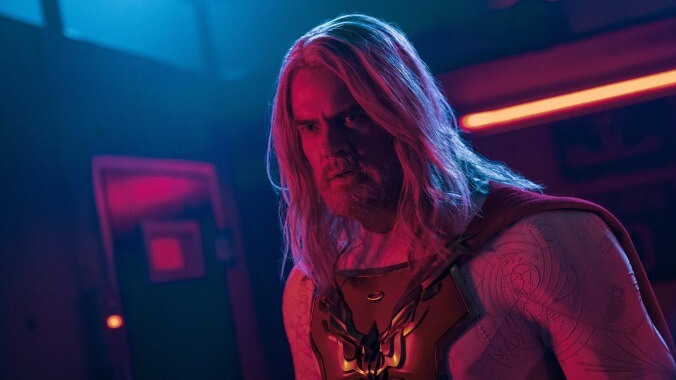There’s nothing super about the family squabbles of Jupiter’s Legacy


Thanks to Marvel Studios, superhero stories in film and on TV have been defined in recent decades by their interconnectedness and franchise potential as much as capes and valiant deeds. That unwavering desire to expand a “universe” of crimefighters and interstellar warriors has undermined some of the more innovative visions, which could only break from convention for so long before dutifully introducing the next chapter. It’s also had the unintended effect of reducing a six- or 10-hour season to a prologue—a feeling that’s never been more prevalent than in the Netflix adaptation of Jupiter’s Legacy.
The series is based on Mark Millar’s Jupiter’s Legacy comic book series and is part of a hefty deal with Netflix, which acquired Millarworld in 2017. On May 6, one day before the show’s debut, the streamer announced plans for more Millarworld adaptations and projects, including The Magic Order series that had previously stalled. But if that show of faith is based on the Jupiter’s Legacy series, the inaugural production in this deal, Netflix executives must have access to some unreleased director’s cut. The superhero drama bowing on the platform on Friday is a slack, derivative story with flat visuals and action. It’s a show so utterly disinterested in its present that it wallows in the past for lengthy stretches of each of its eight episodes, and then bets everything on the final moments of its season finale.
Jupiter’s Legacy contends with the questions that run through much of Millar’s oeuvre, both on the page and screen: What if superheroes actually existed? What responsibility do they have to the rest of us? Would they have a responsibility to the rest of us? Millar was already aping himself with the Jupiter’s Legacy comics—he’d previously expounded on these themes and intergenerational conflict in The Ultimates and The Authority and Kick-Ass, as well as his acclaimed stints at Marvel. This latest exploration of that territory has no new commentary, constructive or otherwise, to offer. The bone’s been picked clean, a fact that becomes glaringly obvious with each episode.
We begin in the present day with aging superhero the Utopian a.k.a. Sheldon Sampson (Josh Duhamel), who looks like Thor in Odin cosplay, as he leads a team of superheroes called the Union. This world’s Superman stand-in, the Utopian’s getting too old for this shit (though the hilariously unconvincing makeup suggests otherwise), but doesn’t feel his son Brandon a.k.a. Paragon (Andrew Horton) is ready to take his place. These misgivings are supposed to be the emotional crux of the show, but Duhamel and Horton share so little screen time—Brandon just plain vanishes for entire episodes—the father-son tensions quickly dissipate. It doesn’t help that the series changes Brandon’s characterization from a scummy, decidedly un-heroic loafer to “guy who just wants Daddy’s love.”
The Utopian’s concerns are somewhat shared by his wife and crimefighting partner Grace a.k.a. Lady Liberty (Leslie Bibb, whose grunting and snarling in fight scenes is the only thing remotely heroic about the show). But Grace is more open-minded than her sexy Santa husband. She thinks there’s room for their kids and the rest of the new generation of superheroes to find their own ways to battle evil—which, in Jupiter’s Legacy, is depicted in the most cartoonish way for the majority of the season.
There are even more members of the Sampson family we’re supposed to care about, though we almost certainly won’t. Sheldon’s older brother Walter (Ben Daniels), a.k.a. Brainwave, thinks the Union should have a hand in governance, which goes against Shel’s beliefs that superheroes are soldiers, not leaders. Youngest Sampson Chloe (Elena Kampouris) is an adult woman still rebelling against her parents. Their family squabbles are a microcosm of a broader sense of discord: The old supes—sorry, superheroes, because this, sadly, isn’t The Boys—are worried that their children won’t look after the world the same way they did. We know this only because the Utopian expresses this fear many times, and not because of the world-building, which is so scant in Jupiter’s Legacy that there only seem to be two periods in U.S. history: the Great Depression and “right now.”
For a show seemingly concerned about the present, and whether the new generation can live up to one from 90 years ago, Jupiter’s Legacy invests much more in its 1929 storyline. The makeup and costuming is just as questionable, as these middle-aged actors are supposed to play the twentysomething versions of their characters, but at least there’s some sense of mystery. How exactly did the Union and Sheldon’s “code”—which boils down to “superheroes don’t rule or kill”—come to be? (Comics readers will of course have some notion of this, but again, there’s so little that isn’t spelled out in this show that a trite origin story passes for intrigue.) Rather than just combine all these flashbacks in one standalone outing, Jupiter’s Legacy doles them out by the episode, repeatedly robbing the contemporary story of what little momentum it does muster. It’s as if Steven S. DeKnight, who developed the series and wrote the first and last episodes before departing, and Sang Kyu Kim, his replacement as showrunner, wanted to jam a full prequel into the story they were supposed to be telling about generational strife.
Then again, who could blame them, when said olds-versus-youngs clash is so hackneyed and poorly defined? If the show takes place, in part, in the year 2020, why pit Gen Z against the Greatest Generation? Characters vaguely allude to the intervening years between when the Union was first formed and whatever year it’s supposed to be in the present, but it’s mostly to intone that “the world has really changed/is changing.” Jupiter’s Legacy never does reveal just what has changed in the last century, aside from the color of the Utopian’s mane. Any corollaries to real-life events are entirely up to the viewer. Whatever battle’s brewing between the show’s heroes and villains (there are several, but only the errant former superhero Silverfox, played by Matt Lanter, is memorable enough to be named here) leads to dissension among the Union about how to handle whatever this growing threat is. The kids (and some of their forebears) would like the option to kill their foes, pretty please, while the Utopian doesn’t think there are any circumstances in which they should claim a life. The latter point-of-view is presented as horribly out of touch, which smacks of copaganda—why, we can’t expect these laser beam-blasting, nigh-invulnerable people to go out and protect the world if they can’t protect themselves!
At his best and worst, Millar has always found ways to infuse his work with topicality—clumsy and ridiculous as the references might have been at times, at least they grounded the story. That realism is one of the hallmarks of Millarworld, where superheroes aren’t ensconced in icy fortresses or gloomy mansions, but reside in the same cities as we do. They know that ordinary people face threats and obstacles that aren’t just of the death-ray variety. In Jupiter’s Legacy, only Walt seems aware of that fact (though that’s not exactly comforting); the rest of his family, including the extended family of superheroes, is too busy navel-gazing and fighting each other. In a bit of unintended symmetry, the show that’s supposed to launch the next big superhero universe is at ideological odds with its creator.